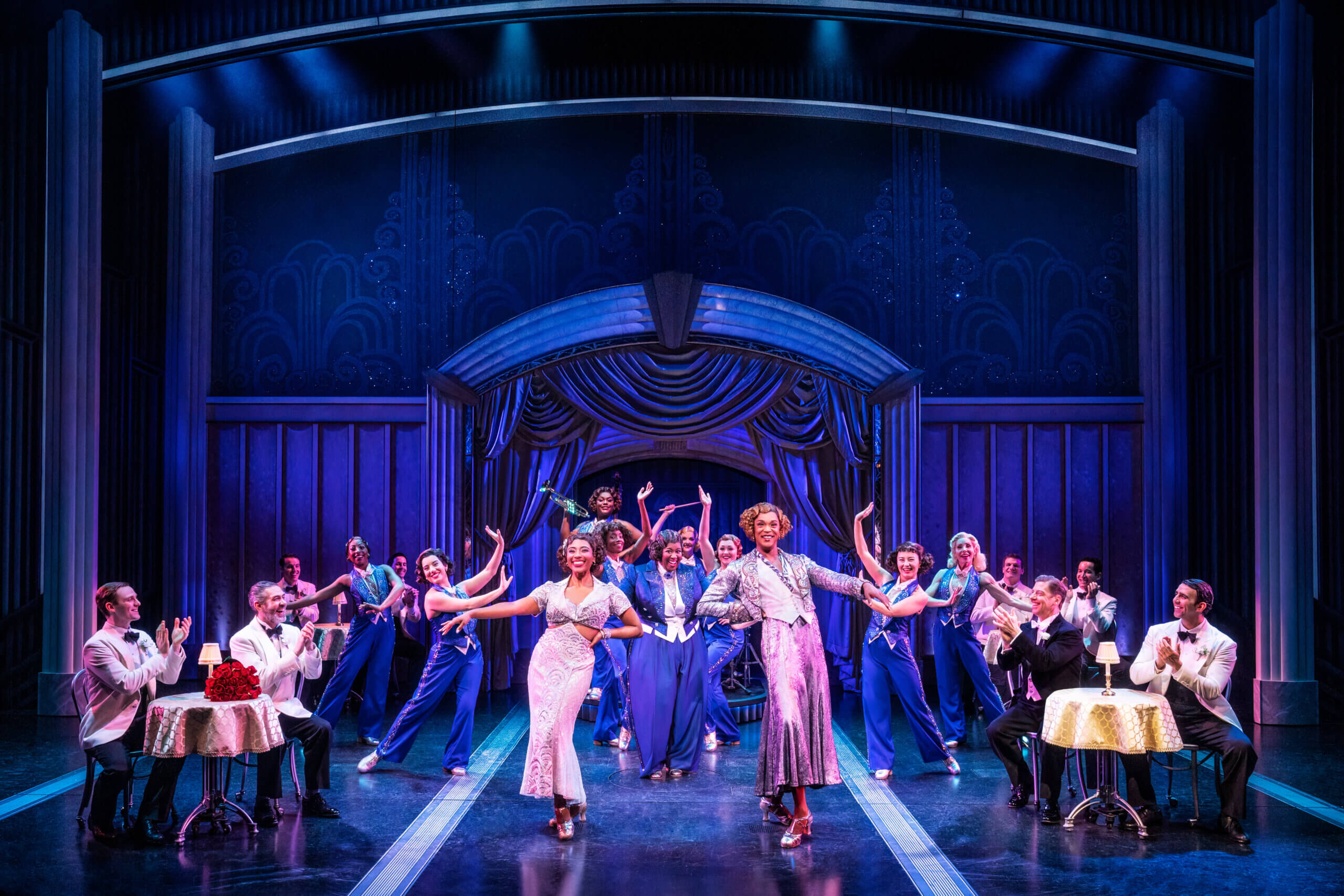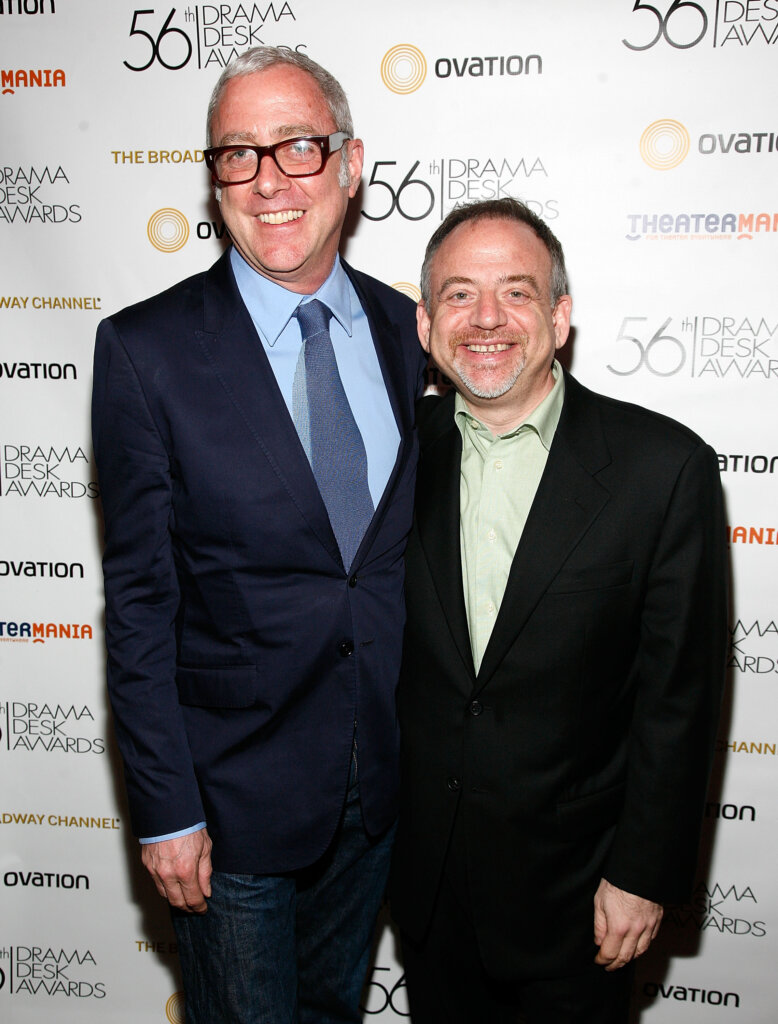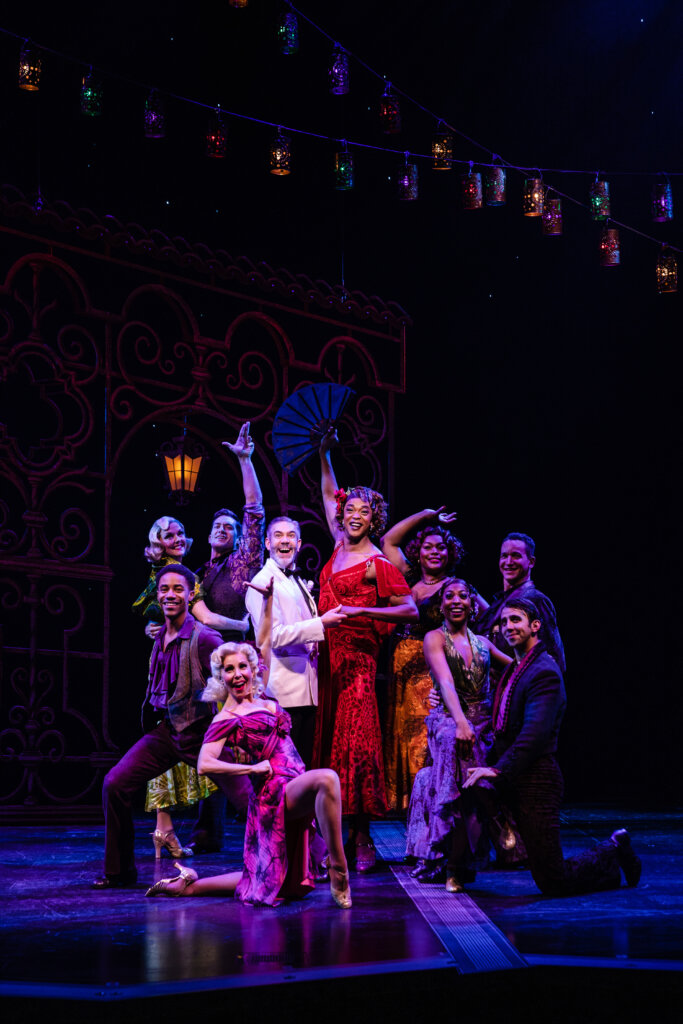How ‘Some Like it Hot’ got to Broadway — and lost a very Jewish song in the process
Tony nominees Marc Shaiman and Scott Wittman share a demo of a cut song and chat about their inspirations and initial fears about taking on the classic comedy

Graphic by Angelie Zaslavsky
At first, Scott Wittman and Marc Shaiman weren’t so hot on the idea of adapting Some Like it Hot into a musical.
“The movie ended up being a double-edged sword,” Shaiman, the composer and co-lyricist, said over Zoom. “For all the people who have loved it, since the day they were born and the first time they saw it, there are people who just immediately classify it as just an old-fashioned, dated kind of comedy.”
What sold the duo, who’d already written a Marilyn Monroe musical for NBC’s Smash, soon to get its own Broadway treatment, was checking some of the baggage of the original 1959 classic, which mines a lot of its humor from putting men in drag and from Monroe’s performance as a ditzy singer likened to “Jell-O on springs.”
“We think that we’ve done what Billy Wilder himself would have done, if he had the chance to write it at this time with the culture being as it is right now,” said Shaiman.
In the show, with a book by Tony winner Matthew Lopez and comedian Amber Ruffin and direction by Casey Nicholaw, Monroe’s character, Sugar, is now Black, played by Adrianna Hicks, and has a richer inner life. The setting has been moved from the late 1920s to the early ’30s. Perhaps most pivotal are changes made to the character of Jerry/Daphne, originally played by Jack Lemmon, and now by nonbinary Black actor and Tony nominee J. Harrison Ghee, who, over the course of the show, while disguised in drag, discovers they are gender-fluid or possibly trans.

‘You could feel the theater shaking’
Adding Black characters and moving the show forward in time, away from flappers and the Charleston, allowed the songwriting duo, Tony winners for 2003’s Hairspray, to key into the Jazz Age, big band sound and wordplay they naturally gravitate to.
“We love the songs of that period and the fact that you can say everything without having to be nasty or dirty, which both Scott and I can be, but it’s just, it’s wonderful to write a love song or a song about longing that uses elegant phrases,” said Shaiman.
The “big band with strings” music of the ’30s is what Shaiman listens to in the car, and he often reflects on the joy of the tunes and their marked contrast with the times they came out of, both the Depression and the rise of the Nazis that followed soon after.
“There’s also the Broadway of it, because we come out of a Depression of our own, of COVID, and the idea of bringing people back into a theater where they could hear an 18-piece orchestra with a huge ensemble tapping — it just glorified everything Broadway was in a new, fresh way,” said Wittman, who co-wrote the show’s lyrics.
For the music, Shaiman’s “Bible” was the era of classic MGM films, a 40-year period that allowed for some leeway between styles. Scat, jazz and even a ukelele-forward number all figure into the musical. The tunes would feel at home in the Great American Songbook, but they propel a story that, at least for the Shubert Theatre, feels somewhat radical.
Daphne’s gender epiphany in the song “You Coulda Knocked Me Over with a Feather,” is greeted with raucous applause — and not just from a young and liberal Broadway crowd, but the type of folks you might expect to come to a show based on a 64-year-old film.
“You could feel the theater shake from the response to it from every age group,” said Wittman. “It’s sort of thrilling in that way that we were able to do that, because it’s actually a celebration of that moment for that character.”
Since beginning work on the show, which came out following controversies surrounding the sensitivities of cross-dressing musical comedies like Mrs. Doubtfire and Tootsie, the musical met its moment at a time of anti-trans legislation.
“Their very lives are at stake now,” Wittman who, like Shaiman, is gay, said of this new legislation. “We came up at a time, you know, in the ’70s in New York, where people we knew, friends of ours from the sort of Andy Warhol crowd, were arrested for wearing high heels. It seems like it’s going back to that. So, if on Broadway, we have a chance to maybe change one little mind in the eighth row, I’m all for it.”

Billy Wilder ‘would have loved it’
Some Like it Hot, nominated for 13 Tonys, covers more ground than the original film or its 1972 musical adaptation Sugar, addressing racism, sexism and gender identity. One thing it doesn’t quite get to is Yiddishkeit, though there are winks and nods for those in the know.
The character of Joe (Christian Borle, Tony-nominated in a role made famous by Tony Curtis) now pretends to be an Austrian screenwriter, a not-so-subtle sendup of Billy Wilder’s thick Viennese accent.
“Spielberg came to the show, and he was a very good friend of Billy Wilder and I think I asked him, ‘Do you think he would have approved?’” said Wittman. “He said, ‘He would have loved it.’”
Another dimension, sadly left off the stage, came from the character Bienstock, the Jewish manager played by character actor Dave Barry in the film. Bienstock was cut from the show, but his duet with Daphne, “Uptown Yiddishe Blues,” speaks to the common musical language of klezmer and the blues, and the partnership of white Jewish and Black Christian musicians in the 1930s. The song has fun with a lot of music theory jokes, familiar Jewish melodies and more than a bissel Yiddish.
“We’ll bend the third, we’ll scoop the fifth,” the characters sing, “and it will be like Ethel Waters joined B’nai B’rith.” You can check out a demo below.
Shaiman was sad to see the song go, but recently played it at 54 Below, as part of an evening of cut songs.
“It celebrated the thing that is maybe the most important part of my life, Lord knows musically, and culturally: my love of the Black community and Black culture,” said Shaiman, who grew up Jewish in Scotch Plains, New Jersey. “I’d like to think it’s not about cultural appropriation, but the fact that both these groups of people have been oppressed for thousands and thousands of years, and through that, somehow came up with such a similar musical vocabulary to express all that.”
Shaiman and Wittman, who also did a song for a Captain America musical for Disney+’s Hawkeye, soon to be an attraction at Disneyland, and for Mary Poppins Returns, are thrilled to be nominated 20 years after their win for Hairspray. With the prospect of victory, another Jewish thread reveals itself.
Did they prepare speeches?
“Kine hara,” said Shaiman, puh-puhing the evil eye. “My mother turns 95 two days after the Tonys and she’s schlepping up from Florida and she’s in no shape to be doing that but she’s like, ‘I want to be there when you win that Tony for my birthday!’ So now I not only have the, you know, will we win, will we won’t, but now I’ll ruin my mother’s 95th birthday if we don’t win! I keep telling her, like, ‘There’s this show called Kimberly Akimbo,’ but she doesn’t want to hear it.”

















